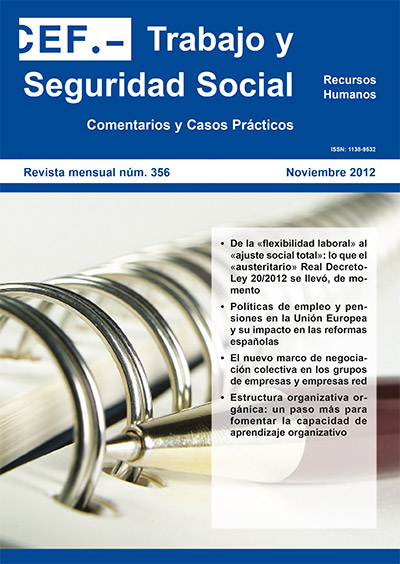From «labour flexibility» to «total social adjustment»: what the «austeritario» Royal Decree-law 20/2012 took away, for the time being
DOI:
https://doi.org/10.51302/rtss.2012.3459Keywords:
economic crisis, social rights cut, austerity laws, social inequalities, total flexibility, public employmentAbstract
The Royal Decree-law 20/2012, of July 13, has carried out the largest setting of scores with the Spanish welfare state throughout the all democratic period. This regulation contains 90 pages of new social rights cuts and tax increases, all written in one stroke and without negotiation, political or social. The effective implementation of these measures mean to the Spanish to suffer practically all restrictions that formally placed control countries have been forced to introduce to satisfy the conditions of the «rescue plan». But this model of intervention is synonymous, for the life of the citizens of the country placed control, not just more «unemployment», «poverty» as well, but true social «indignity», through a endless policy of apparently reforms that cover social rights cuts: elimination of a bonus for public employees, suspension of collective rights and rights of attention to situations of dependency, cuts unemployment protection...
But it is neither the first rule in this direction, nor the last approved. In this regard, recently, we can cite the examples of Royal Decree-law 23/2012, by extending the so-called «Plan Prepare», extraordinary measures of protection to all those who lose unemployment protection, or the Royal Decree-law 25/2012, which includes many more controls on the unemployed, who are obliged, in return for receiving benefits, to remove the ashes after fires, regardless of their qualifications. Instead, they have adopted rules that recognize extraordinary credits to meet expenditure on armaments, on the grounds of preventing the loss of highly qualified employment or, among others, to avoid «deteriorating image of Spain», Royal Decree-law 26/2012, of September 7. Thus, once again, the distribution of sacrifices is unequal among citizens and tends to harm the most vulnerable, which grow in a manner disproportionate inequalities. But social inequalities not only break the cohesion and generate a high risk of social violence, but hinder economic growth.
In this article the author reports on each and every one of these changes, a map as a legal-social, but also economic, rights and cuts to their impact on the regulation and the level of protection that such rights proposed. But the article goes further. Once «explained» in detail the changes in public employment, unemployment protection, care dependency, policies on helping youth emancipation, the author proposes «understanding» in depth what is behind those sacrifice of rights measures without success, quite the opposite. And that's where we are proposing a far more disturbing thesis: all these rules are merely the formal coverage of a major constitutional mutation, a real Copernican volte-face in our form of government, so that against the social democratic principle of law is be forged before our eyes what the author calls a «State Austeritario» –a form of state based on totalitarian imposition of custodial rights to their citizens to sustain the level of financial system gain–, generator, while, of Invalid a law constitutionally, socially Unjust and economically Inefficient.



















